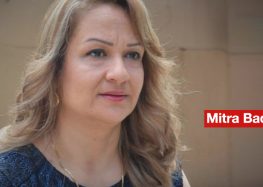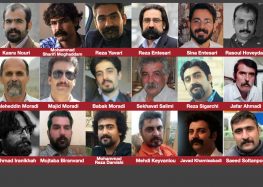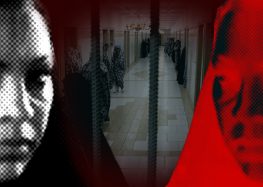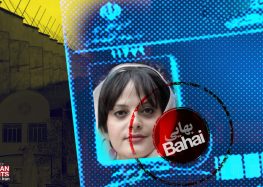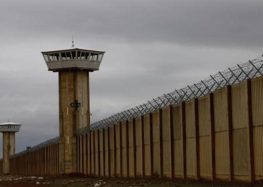Peaceful Dissent Denied in Iran by Equating Criticism of the Government with Religious Sin
![The Supreme Leader’s chief of staff Mohammadi Golpayegani (right): “Opposing the Islamic [Republic] is certainly the greatest wrong and if anyone, in any cloth or position, opposes it, he has committed the worst vice because the pure blood of thousands of youth has been shed to establish this state.”](https://iranhumanrights.org/wp-content/uploads/139404071416574575586894.jpg)
The Supreme Leader’s chief of staff Mohammadi Golpayegani (right): “Opposing the Islamic [Republic] is certainly the greatest wrong and if anyone, in any cloth or position, opposes it, he has committed the worst vice because the pure blood of thousands of youth has been shed to establish this state.”
Increasingly, hardliners are using a new weapon in the arsenal of repression: religion. While prosecutions of activists have typically been carried out under broad national security-related charges, political dissent is increasingly being portrayed by officials of the Islamic Republic as a religious violation.
The equation of dissent with sin is part of a broader attack in which the right to peaceful dissent, ostensibly guaranteed in the Iranian constitution (as well as in the international covenants to which Iran has freely joined) is effectively denied and those who engage in it are prosecuted by judicial officials under far more serious charges. “Corruption on Earth,” for example, carries a possible death penalty.
“To oppose the state is the greatest sin,” said Mohammadi Golpayegani, chief of staff to Iran’s Supreme Leader, Ayatollah Khamenei, to a group of clerics and seminary students in Gilan Province on June 13, 2015.
Golpayegani described the Islamic Republic as the “greatest good of our time” and, as reported by ISNA (the Iranian Students News Agency) added, “Opposing the Islamic [Republic] is certainly the greatest wrong and if anyone, in any cloth or position, opposes it, he has committed the worst vice because the pure blood of thousands of youth has been shed to establish this state.” In his eyes, any opposition to the Islamic Republic, in word or deed, or any questioning of its infallibility, constitutes a grave offense.
Under this line of thinking, financial corruption is considered a lesser crime than women who flout ultraconservative rules on public attire because economic crimes are not an overt political challenge to the state. A woman’s lack of adherence to “proper” hijab, however, is seen as a direct challenge to the regime’s legitimacy. In the words of Ayatollah Sobhani, “The hijab is a symbol of the Islamic Republic and those who don’t observe it are sticking their tongue at it. Profiteers, on the other hand, don’t care about the state.”
Such comments are not new. On May 2, Mohammadi Golpayegani quoted the Supreme Leader as saying, “Protecting the Islamic Republic is the greatest good and opposing it is the greatest wrong.” Golpayegani added, “Some think that promoting virtue or preventing vice is only limited to dealing with women in the streets with poor hijab. But we must be aware that the greatest vice is opposing the Islamic regime.”
In his speech on the occasion of the Iranian New Year, Supreme Leader Khamenei stated his view clearly: “The greatest good is to establish and preserve an Islamic state… while by contrast, moral corruption is wrong, helping the enemies of Islam is wrong, weakening the Islamic state is wrong.”
Going beyond verbal exhortations, the Supreme Leader issued a fatwa, or religious decree, forbidding people from publicly exposing injustice by officials of the Islamic Republic. In reply to a question from one of his religious followers on whether it would be appropriate to publicly reveal injustice or treason by government officials, Khamenei wrote: “It is not a problem to report injustice or treason to officials and government institutions so that they can be properly pursued and investigated… but revealing them to the people is forbidden because it creates mischief and corruption, and weakens the Islamic government.”
Equating political opposition with religious sin has had profound consequences for the lives of those who have questioned the dictates of the government: political opponents have been charged and sentenced to punishments of biblical proportions, with many spending long years behind bars and some facing the death penalty.
Officials often accuse government critics of opposing the country’s system of velayat-e faqih (Guardianship of the Islamic Jurist, the ideology formulated by the Islamic Republic’s founder, Ayatollah Khomeini, which states that an Islamist jurist, or Supreme Leader, must provide guardianship over the government to ensure its compliance with Islamic law). As a result, such critics are accused of challenging the very foundations of religion.
This view is not shared by the majority within the Shia religious establishment. Most Shia clerics, in fact, do not accept the concept of velayat-e faqih. Indeed, the Islamic Republic is imposing the view of its ruling class and suppressing the plurality of views in Shia religious thought.
Ayatollah Mohammad Yazdi, however, who is the current head of the Islamic Republic’s Council of Guardians, the body charged with ensuring that all political candidates and laws conform to Islam and the Islamic Republic’s constitution, has assured all that the Supreme Leader can do no wrong: “The Supreme Leader never makes mistakes in his decisions,” Yazdi said in a speech in 2011. “That’s because if [the Supreme Leader] is thinking of making a decision that’s 100 percent harmful to the Islamic nation, the Hidden Imam [the ultimate savior of mankind, who, according to the Twelver branch of Shia Islam practiced in Iran, will return to bring peace and justice to the world] has a responsibility to advise him against it.”
These views have resulted in the belief that opposing velayat-e faqih is equivalent to opposing absolute Truth itself. As stated by Yazdi, “Opposing velayat-e faqih is the same as opposing the Imams and it is on the [same] level as questioning God’s singular authority.”
In such a system, where dissenters are not only enemies of the state, they are enemies of God, there is no possibility of acceptable peaceful opposition, the hallmark of democratic governance.

